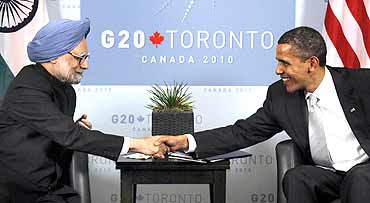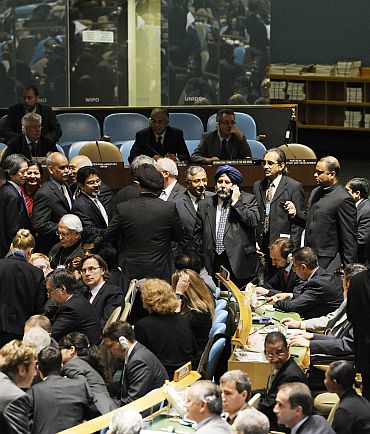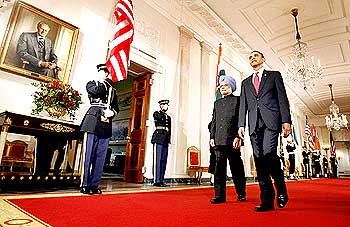 | « Back to article | Print this article |
'It's not coincidence that India is the first stop on a major trip to Asia'
Briefing the White House press corps were Press Secretary Robert Gibbs, Under Secretary of State for Political Affairs Williams Burns, Deputy National Security Adviser for International Economic Affairs Mike Froman and Deputy National Security Advisor for Strategic Communication Ben Rhodes.
Journalist: Do you want more involvement from India in Afghanistan? And how do you see Indian and Pakistani interests balanced in Afghanistan?
UNDER SECRETARY BURNS: Well, we've long made clear our support for India's contributions in Afghanistan.
India has contributed something like $1.3 billion worth of development assistance in agriculture and other areas over the last eight or nine years in Afghanistan -- at some cost, because there have been Indian workers who have lost their lives during that period.
So we not only recognise but support the kind of role that India has been playing in supporting development in Afghanistan.
So the President is visiting India, Indonesia, Japan, South Korea. The Indian prime minister this week is visiting Japan, Malaysia. And the Secretary of State also is visiting a number of Southeast Asian countries.
And if you connect all these dots, there's one big red dot missing. (Laughter.)
Should we read something into this?
RHODES: No, I'd just say a couple things. First of all we were pleased to have a presidential trip to -- I'm just going to presume you're talking about China and not another country that we're not visiting.
We were pleased to visit China last year and we continue to have close cooperation with the Chinese on some issues, even as we disagree on others.
The President will meet with President Hu in the course of this trip because China, of course, is attending the G20.
It's not coincidence that India is the first stop on a major trip to Asia.
Asia is a focus, as I've said. And we see India as a cornerstone of our engagement with this hugely important region of the world.
And we believe that we have shared interests with India on a broad range of issues, but we also have shared values, because we're two democracies.
And the kind of relationship that we have as the world's two largest democracies is relevant to our ability to have a deep, bilateral partnership, but also to work together in the region and around the world.
So I think that building from that, too, each of the countries we're visiting are democracies and close friends with the United States -- Indonesia, an emerging democracy, and then Japan and South Korea, of course, being longstanding, close allies of the United States.
And I think it speaks to the strength of democracy in Asia.
To those who question whether democracy is proving that it can advance and that it can foster economic development, India sets a powerful example, as does Indonesia, as countries that have robust economic growth while also having very dynamic democracies, just as South Korea and Japan also have had growth over previous decades while strengthening their own democracies.
ALSO SEE: What Barack Obama will do in IndiaWhat Obama plans to tell Indian business
'This will be the longest trip that the President will have taken as President to a foreign country'
And one thing they recommend is that the United States work with India to secure for India a permanent seat on the UN Security Council.
And I wonder, your reaction to the characterisation that the expansion of ties has stalled and where do we stand on the Security Council's seat?
RHODES: First of all, I think that the notion that it has stalled is just not in line with the facts that are apparent both in terms of atmospherics and in terms of substance.
On the atmospherics, Prime Minister Singh was the first State visit that we hosted here.
This will be the longest trip that the President will have taken as President to a foreign country.
And it speaks to the depth of his partnership with Prime Minister Singh on a personal basis, but also the partnership between our countries.
On a substantive basis, if you look at, again, the breadth of the issues -- and as we get to India, I think we'll be able to finalise some of the discussions we're having around some of these issues, go through in detail the outcomes of the President's meeting with Prime Minister Singh on the trip.
But we are moving forward on a whole host of energy projects together related to clean energy and climate change.
We are advancing new cooperation on agricultural development.
We've continued to expand our military-to-military cooperation in terms of exercise and in terms of how we communicate with one another.
We have deepened our information-sharing on counterterrorism, for instance, exemplified by the access we've provided the Indians to David Headley.
We have partnered with the Indians -- continue to partner with them in Afghanistan. And so I -- and we've actually upgraded the G20 to the premier economic forum in the world, in part to give countries like India a greater voice.
So I think across the board, we're moving forward with India on a whole range of issues on a very substantive basis that speaks to the fact that -- as Bill said, if you look at the previous two administrations, we had some major irritants related to nuclear issues.
I think the civilian nuclear deal helped move beyond that.
But now I think what we're trying to do is use the opportunity afforded by that to lift this relationship up to a new level where India is really a strategic partner for the United States in the region and in the world.
And the Security Council, the first thing I'd say is simply that -- first of all, we've, through the G20, through our focus on the G20 and some other bodies, already sought to give India a greater voice in global architecture -- for instance, saying that the G8 can't deal with global economic issues as effectively as the G20.
The reasoning behind that was because you need India at the table on those discussions, just as you need China and other emerging economies.
On the Security Council, they are going to be a member, first of all, in terms of the next cycle, so we'll have an immediate opportunity to cooperate with them on the Security Council.
'Our relationship with India will be important to this country for many years to come'
We want to approach that challenge in a way that ensures the effectiveness -- and hopefully strengthens the effectiveness -- of the Security Council.
Given India's rise and its significance, we believe that India will be a central part of any consideration of a reformed Security Council.
Journalist: Can you just maybe explain a little more about why not just do it? What is the thinking behind not moving ahead quickly with this?
BURNS: That's about as far as I'm going today. (Laughter.)
There is a downside, though, in your view? You just don't want to articulate what it is?
RHODES: It's a very complicated issue that involves international architecture in many countries.
But we'll continue to work -- to talk this through as we move forward on the trip.
Can you speak the timing of the trip just a little bit?
Obviously, the President has been trying to schedule this trip for a number of months. But does the timing have nothing at all to do with the election?
GIBBS: No, the timing has all to do with the G20 and APEC.
Look, obviously, this is -- as we will soon learn, this is a long way to travel and there's a lot of space in between individual stops.
It was important in doing a trip of this magnitude and in having the G20 in this region of the world to highlight the important relationships that this President believes are going to be crucially important not simply to this administration -- you heard Bill talk about that from a bipartisan perspective, our relationship with India has always been important to both Democratic and Republican Presidents.
But certainly, this is a relationship that is important to this country and will be important to this country for many years to come.
So it is -- it's timed around those economic meetings of which are very important.


